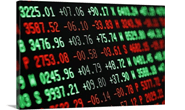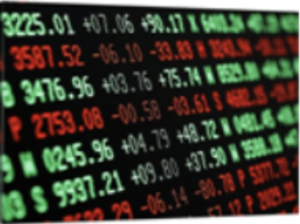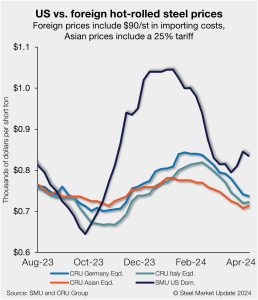Russel Metals' earnings slide 33% in Q1
Russel Metals’ earnings fell in the first quarter, but the Toronto-based metals distributor sees steel prices stabilizing in the near term and staying above historical averages.
Russel Metals’ earnings fell in the first quarter, but the Toronto-based metals distributor sees steel prices stabilizing in the near term and staying above historical averages.

On Monday and Tuesday of this week, SMU polled steel buyers on an array of topics, ranging from market prices, demand, and inventories to imports and evolving market chatter.

Sheet prices were flat or moderately down again this week – underscoring the shift in momentum we’ve seen over the last month. The exception was hot-rolled (HR) coil, which was largely unchanged from last week.
Nucor Corp. announced that its plate mill group would cut prices for as-rolled, discrete, and normalized plate with the opening of its June order book. The Charlotte, N.C.-based steelmaker said in a letter to customers on Monday, April 29, that tags would be lowered by $90 per short ton (st). That would bring its base price to roughly $1,200/st.
Nucor lowered its weekly base spot price for hot-rolled (HR) coil by $10 per short ton (st) this week.
What a difference a month makes. In late March, it seemed like the US hot-rolled (HR) coil market was poised to cycle upward. Large buyers had re-entered the market and placed big orders earlier in the month. Several outages were underway or upcoming. And expectations were that lead times would continue to extend. Cliffs said […]
Cleveland-Cliffs said its base spot hot-rolled (HR) coil price will be $850 per short ton (st) with the opening of its June order book. The company made the announcement in a press release and in a letter to customers on Friday.

Week-over-week trading activity in US steel derivatives markets was relatively muted, with prices maintaining their downward direction since the beginning of the month. Bids have materialized at the lower end of this range in the May, as the nearby backwardation continues to roll on - just as we saw with April being a premium over May.
I’ve gotten some questions lately about whether the huge gap between domestic hot-rolled coil (HR) prices and those for cold-rolled (CR) and coated is sustainable. I remember being asked similar questions about the wide spread between HR and plate that developed in early 2022. I thought at the time that there was no way that spread could hold. Turned out, I was wrong. That was humbling. And so I’m not going to make any bold predictions this time.
We've used the word "unprecedented" a lot over the last four years to describe steel price volatility. Over the last two months – despite earlier predictions of a price surge - we've seen unprecedented stability.
Nucor executives explained their recently introduced hot-rolled (HR) coil consumer spot price (CSP) is a way to serve their customers and deal with market volatility.
Nucor’s earnings slipped in the first quarter of this year, but the company said it launched key growth initiatives during this time period.
Nucor is holding its hot-rolled (HR) coil consumer spot price (CSP) flat this week.
Nucor has appointed Nicole B. Theophilus to the newly created position of EVP of talent and human resources, effective April 29.
To the surprise of many — myself included — flat-rolled steel prices appear to be in a holding pattern… again. This is not familiar territory for hot-rolled (HR) coil, at least not over the past few years. Its pricing volatility (as my colleague Michael Cowden has noted in past columns) may rival the elastic moves […]

It has been a crazy 2024 so far for hot-rolled coil (HRC) futures!!!

Earlier this week, SMU polled steel buyers on an array of topics, ranging from market prices, demand, and inventories to imports and evolving market chatter.
The steel market appears to be finding a new, higher normal with the shocks of the pandemic and the Ukraine in the rearview mirror. The good news: a more profitable and consolidated post-Covid US steel industry has been able to invest in operations. That includes efforts to decarbonize. The bad news: That “new normal” could be tested. Because it’s not just domestic sheet prices that have been volatile. Geopolitics are too.

Sheet prices varied this week. While hot-rolled (HR) coil pricing was largely flat, cold-rolled (CR) coil and tandem product pricing eased slightly reflecting the momentum shift seen last week for HR coil. SMU’s average HR coil price was flat from last week at $835 per short ton (st) – potentially emphasizing the tension between competing […]
Nucor said its spot hot-rolled (HR) coil price for the week of April 15 will be $835 per short ton (st), up $5/st from last week. The Charlotte, N.C.-based steelmaker said the new price would be effective immediately in a letter to customers on Monday morning. The exception again is California Steel Industries (CSI), Nucor’s […]
Last week was a newsy one for the US sheet market. Nucor’s announcement that it would publish a weekly HR spot price was the talk of the town – whether that was in chatter among colleagues, at the Boy Scouts of America Metals Industry dinner, or in SMU’s latest market survey. Some think that it could Nucor's spot HR price could bring stability to notoriously volatile US sheet prices, according to SMU's latest steel market survey. Others think it’s too early to gauge its impact. And still others said they were leery of any attempt by producers to control prices.

Steel prices continued to ease lower in early March – a trend seen since mid-January – before showing signs of bottoming and inflecting up. The SMU Price Momentum Indicator for sheet products shifted from lower to neutral mid-way through the month after Nucor, Cleveland-Cliffs, and ArcelorMittal all targeted new base minimums between $825-840 per short […]

US hot-rolled (HR) coil has become increasingly more expensive than offshore hot band as stateside prices have moved higher at a sharper pace vs. imports.
Nucor made waves in the sheet market when it announced on Friday that it would begin publishing a weekly hot-rolled (HR) coil price. The Charlotte, N.C.-based steelmaker arguably made even bigger waves on Monday when it posted its first weekly HR number: $830 per short ton. That’s $70/st lower than the $900/st HR price Cliffs announced in late March. It’s also lower than prices in the mid-$800s that other mills were (less publicly) seeking.

Sheet prices saw a slight momentum shift this week after consecutive gains in the prior two weeks. Plate edged lower on greater competition off easing demand, according to our latest check of the steel market.
Cleveland-Cliffs and the Global Steel Climate Council (GSCC) are two of the newest members to join the World Steel Association (worldsteel).
Nucor said its new weekly hot-rolled coil spot price is not meant as a substitute for any current price indices.
Nucor said its spot hot-rolled (HR) coil price this week will be $830 per short ton (st).
Sheet prices continue to inch higher. That’s a welcome development for many. But it’s also a far cry from the price surge many predicted about a month ago. Remember the theory that supported a spring surge: Sheet prices would soar on a combination of mill outages, stable-to-strong demand, restocking, mill price increases, and (potentially) trade action against Mexico as well.
Nucor plans to publish a weekly spot price for hot-rolled (HR) coil beginning on Monday, April 8, according to a press release and letters to customers. The Charlotte, N.C.-based steelmaker said its published HR price would be derived from “both quantitative and qualitative data” in the letter to customers on Thursday, April 4.